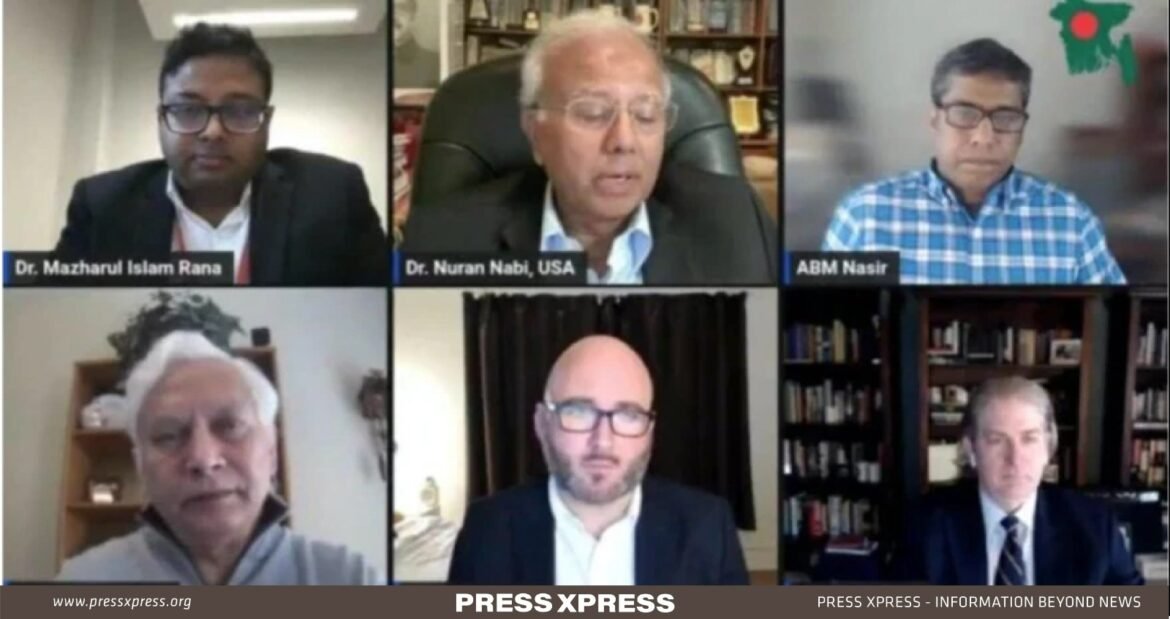Bangladesh’s sustained socioeconomic progress under Prime Minister Sheikh Hasina faces two major challenges: violence and disinformation, experts said during a global webinar. They urged worldwide support for Bangladesh’s battle against violence and misinformation.
Recent political strife in Bangladesh caused by the BNP (Bangladesh Nationalist Party) has put the country in the focus of attention around the world. Something that started as peaceful dissent has become violent, causing chaos and destruction. Bangladesh’s endeavors to enhance its economy and infrastructure have been overshadowed by the mishandling of the recent unrest during the instability. This has negatively impacted Bangladesh’s international standing and may discourage foreign investments and partnerships.
A distorted narrative that ignores the complexities of Bangladesh’s socio-political landscape and the government’s coordinated efforts to promote sustainable development and progress has resulted from the BNP and its affiliates’ persistent misinformation campaigns, which have made the problem worse.
Furthermore, specific international organizations have aided in the escalation of the unrest, perpetuating the discourse surrounding political instability in Bangladesh without possessing a comprehensive understanding of the fundamental elements that have contributed to the situation. Due to its one-dimensional portrayal, the difficulties the country faces have been exaggerated, ignoring the people’s tenacity and the progress made in the direction of socioeconomic growth.
Experts seek global support for Bangladesh’s fight against violence, misinformation
During a recent webinar entitled “Violence and Misinformation: Barriers to Economic Prosperity in Bangladesh,” prominent speakers emphasized crucial concerns impeding Bangladesh’s economic progress under the leadership of Prime Minister Sheikh Hasina. The discussions emphasized the impact of violence and disinformation, emphasizing how destructive they are to the advancement of the country.
The speakers praised Bangladesh’s impressive development, especially concerning major infrastructure undertakings including Metro Rail, the Padma Bridge, and the Kornofuli Tunnel. The current administration’s steady governance over the previous 15 years has been attributed to these projects. They also lauded the country’s progress in improving the social safety net by providing amenities like stipends for independence warriors, the aged, and the crippled, thereby lifting millions of Bangladeshis out of poverty. The Jamaat-BNP-led opposition’s avoidance of turmoil and violence might expedite the nation’s progress, they said. They also expressed concern regarding the obstacles presented by acts of violence masterminded by the BNP-Jamaat-led opposition, which impedes the country’s ongoing progress.
Leading writer, freedom fighter, and councilman Dr. Nurun Nabi chaired the event. Professor Abdur Chowdhury, Professor ABM Nasir, Chris Blackburn, a security analyst, Seth Oldmixon, a political analyst, and senior researcher Dr. Mazharul Islam Rana were the five internationally renowned panelists.
The menace of political unrest
The speakers stressed the disruptive effects of such activities, citing a recent occurrence on October 28th where the BNP Jamaat planned an anti-government march that resulted in violence and destruction. Acts including the murder of a policeman, arson attacks on public property, and assaults on journalists during the inauguration of the Bangabandhu Tunnel underscored the gravity of the situation. Speakers emphasized the importance of following the constitutional process overseen by the Elections Commission, rejecting the opposition’s demand for a caretaker government as unconstitutional.
Applauding Bangladesh’s economic promise and international recognition
Professor Abdur Chowdhury emphasized the noteworthy recognition of Bangladesh by Goldman Sachs & Chase as one of the five emerging economies on a global scale. The speaker underscored the considerable potential of the nation to attain upper-middle-income status by the year 2031. Bangladesh’s emphasis on developing human capital and fostering a proficient workforce was considered essential for maintaining economic expansion, in defiance of obstacles presented by international sociopolitical conditions, including the Ukraine and Middle East conflicts.
Chris Blackburn stated, in reference to a recent survey conducted by the International Republican Institute (IRI), that Prime Minister Sheikh Hasina’s approval rating stands at 70%, notwithstanding the myriad of prevailing economic challenges.
Tackling disinformation and ensuring stability
The webinar reviewed the detrimental consequences of misinformation campaigns, specifically the BNP-Jamaat alliance’s involvement in the dissemination of false narratives on the internet. Dr. Mazharul Islam underscored the adverse consequences that misinformation and disinformation have on the socio-political stability of Bangladesh. The speaker emphasized the enduring impact of anti-liberation factions, spearheaded by the fugitive BNP leader Tarique Zia and Jamaat-e-Islam, in disseminating rumors concerning the Bangabandhu assassination scheme and contemporary occurrences. Prominent examples of this disinformation campaign were emphasized, including journalist Chandan Nandy’s fabrications, the resolution passed by the EU Parliament regarding the Odhikar case, and the briefing provided by the UN Office of the High Commissioner for Human Rights on the violence carried out by the BNP on October 28th.
Combating extremism and promoting democracy
Dr. Mazharul Islam emphasized the risks associated with misinformation and disinformation campaigns, with a specific focus on their capacity to foster sociopolitical unrest. By highlighting historical anti-liberation forces, he underscored the enduring nature of disinformation strategies that seek to obstruct the stability and advancement of the nation. In his appeal to American policymakers to provide assistance to Bangladesh in its struggle against the emergence of Islamic militancy, Professor Nasir underscored the critical nature of fostering a progressive democracy and moderate Muslim values within the country.
Seth emphasized the criticality of adopting a proactive stance to counter extremist propaganda, placing particular emphasis on the promotion of positive information as a means to offset the misinformation campaign. The partnership between the Bangladesh Election Commission and social media platforms was praised for its proactive approach in addressing the issue of disinformation. External stakeholders viewed the complex political environment, specifically the relationship between BNP and Jamaat, as a challenge, emphasizing the need for a balanced approach to engagement.
Overall, the webinar underscored the imperative nature of confronting violence and misinformation to safeguard the ongoing economic progress of Bangladesh. The nation recognized the critical nature of international collaboration and support in overcoming these challenges and cultivating a stable environment conducive to sustainable development and prosperity.


